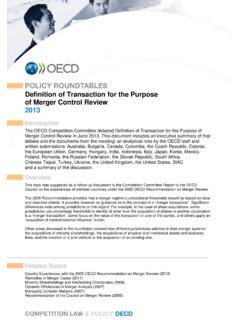Transcription of THE ZAMBIAN JUDICIAL SYSTEM: A REVIEW OF …
1 CHAPTER 3 THE ZAMBIAN JUDICIAL system : A REVIEW OF THE jurisdictional LAW Roger Purdy Local courts The ZAMBIAN JUDICIAL system comprises approximately 460 courts, arrayed, basically, in a hierarchy with four primary levels. At the base, stand 415 local courts, presided over by 8 senior presiding justices, and 407 presiding justices, assisted by 428 ordinary Under the Local Courts Act, the JUDICIAL service commission appoints the local court justices,2 a local courts' adviser, and as many local courts officers as it sees The Local Courts' Adviser, officers and other officers authorized by the chief justice by authority of s 2(1) of chapter 45 of the Laws of Zambia generally act as supervisors of the local courts.
2 The local courts are divided into Grade A and Grade B courts, and their jurisdiction is limited according to the grade which the court warrant assigns to As to civil jurisdiction, a Grade A court may exercise jurisdiction to determine claims not exceeding K200, a Grade B court may hear claims up to K100 in These limits as to civil claims do not appear to apply to inheritance or matrimonial claims under customary A local court may not hear matrimonial or inheritance claims not based on custom-ary The law provides that a local court may not exercise jurisdiction over ad-ministration or distribution of an intestate deceased's estate and must transfer such a case to the High Court if a party or the administrator general has claimed that custom-ary law should not The High Court in a case in which these matters arose.
3 Explained that this rule only in effect suspended the power of the local court, precluding it from exercising jurisdiction until the High Court has ruled on the Thus, this section does not prohibit the High Court from ordering that the estate be handled according to customary law in a local To rule otherwise, of course, would allow a party to oust jurisdiction from the local court by simply filing an application with the High Court. The High Court, or the local court, may however, transfer such a case on its own initiative to the High Court if it deems it is Legislative restric-tions on the laws which the local courts may enforce and apply further define and limit the jurisdiction of these courts.
4 Local courts are primarily authorized to apply and enforce customary law, and by-laws and regulations promulgated under the Local Government Act. In addition, they may apply and enforce such written laws as are specified by relevant statutory As to criminal jurisdiction, local courts may try specified offences under written laws, but not crimes under customary laws, although similar offences may exist under the Penal No local court may try an offence in consequence of which death is alleged to have occurred, or which may be punished upon conviction with As to sentencing in general, a grade A court may not impose a fine exceeding K100, an imprisonment sentence of more than one year.
5 Or corporal punishment of more 68 LAW IN ZAMBIA than 12 strokes of the cane. For Grade B courts, the limits are: fines must not exceed K50, imprisonment may be no more than 6 months, and only six strokes of the cane may be Foreign written laws, in general, are not enforceable by ZAMBIAN local courts,16 but interpretation of the provisions allowing enforcement of "African customary law" has allowed application by ZAMBIAN local courts of customary laws of tribes native to foreign countries where the court has found that a ZAMBIAN resident before the court has retained, and continued to live by, such a foreign customary law after migrating to The Local Courts Act also specifies limits on the territorial jurisdiction of a local court.
6 As to most civil matters, the court may hear a case if the defendant resided within the court's jurisdiction, or if the cause of action arose within the court's jurisdiction. A court may only hold proceedings adjudicating rights over real property, however, if the court has territorial jurisdiction over the situs For exercise of criminal jurisdiction the charge must claim the accused committed the offence, or was an acces-sory to an offence "wholly or in part" within the court's It seems, according to this section, that an accessory may be tried only where his own acts, which give rise to the charge of accessory, were carried out, not necessarily where the principal offence occurred.
7 This, if true, could give rise to the anomalous and inefficient situation where a principal is tried in one court, but accessories assisting in carrying out the same crime would have to be tried in a different court. No reported cases considering this problem have appeared, and the provision conflicts with, and perhaps thus is overriden by, provisions in the Criminal Procedure Code outlining division of jurisdiction and venue preference and suggesting different results from the clauses of the Local Courts Recognition of the extensive problem of scarcity of legal training and experience has shaped certain aspects of the administration of justice in local courts.
8 For example, the Local Courts Act discards strict adherence to separation of powers at the local level. A member of the bench in a local court may sit and try an offence arising from a by-law or rule in the making of which he or his colleagues Moreover, serving diverse ends of maintaining efficient, inexpensive, and somewhat traditional JUDICIAL processes, and again perhaps reflecting the scarcity of legal training, the Act prohibits use of legal representation, except in specified circumstances, especially for defending against criminal Subordinate Courts At the next higher level, Zambia has 42 subordinate courts, presided over by 7 senior resident magistrates.
9 12 resident magistrates, 22 Class I magistrates, 30 Class II and 25 class III magistrates, appointed by the JUDICIAL service The jurisdiction of a subordinate court depends on its class rating, and the type of magistrate sitting. For example, a subordinate court designated class I, with a resident magistrate or Class I magistrate sitting, may hear claims in personal suits arising from tort, contract, or both, where the amount in controversy does not exceed four hundred If, however, a senior resident magistrate sits, the limit rises to eight hundred The jurisdiction varies between classes, not only in amount, but as to types of action triable as well.
10 Only a first or second class subordinate court may entertain an application The ZAMBIAN JUDICIAL system 69 for an ejectment order; enforcement of attachments is reserved to first and second class courts; and while all subordinate courts may hear certain actions grounded in marriage and family law, certain other types of cases in those areas are restricted to the higher subordinate Somewhat unexpectedly, the Criminal Procedure Code also grants to subordinate courts a limited type of civil jurisdiction for awarding a (non-appealable but apparently reviewable under revisory jurisdiction) judgement for the value of property illegally obtained by a public service This grant has been read narrowly, however, to allow only the award itself.








